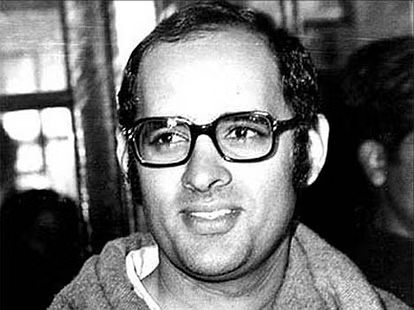NewsGate Press Network
By Pankaj Vohra
It will be exactly 44 years on Sunday since Sanjay Gandhi, Indira Gandhi’s younger son passed away following a tragic plane crash in the Chanakyapuri area, leaving behind his hand-picked MPs and leaders who were to guide the Congress for over four decades.
Pranab Mukherjee, Ambika Soni, Arjun Singh, Kamal Nath and Ghulam Nabi Azad amongst many others, all owed their political careers to Sanjay, who had the foresight to put them on the fast lane, despite opposition from many senior colleagues of his mother.
Everyone had written off the Congress after it was mauled by the newly formed Janata Party in the 1977 general elections that also saw the sitting Prime Minister, Indira Gandhi losing from Rae Bareli by nearly 58,000 votes. Sanjay also making his electoral debut was vanquished by Ravinder Pratap Singh from Amethi.
However, his never say die spirit remained alive and despite being hounded by the Janata dispensation, he planned the downfall of the Morarji Desai government, ironically with the help of Raj Narain, the man who had defeated his mother.
Sanjay had sensed that Chaudhury Charan Singh had become ambitious and wanted to be the Prime Minister, and thus the blueprint for the fall of the government was prepared following many rounds of meetings between him and Raj Narain, at the Pusa Road residence of industrialist Kapil Mohan.
The erstwhile socialists in the newly formed party were agitated over the dual membership held by former Jana Sangh leaders, who besides the Janata Party, continued their association with the RSS. This became one of the many points on which the friction within the organization started.
Sanjay would regularly visit Kapil Mohan’s house accompanied by his schoolmate and friend Kamal Nath, who would dutifully wait outside while the negotiations with Raj Narain were held behind closed doors.
The Congress had split the second time and by January 1978, Sanjay had placed his hand-picked supporters to help his mother. Buta Singh became the sole general secretary to begin with under the presidentship of Indira Gandhi and sometime later, Abdul Rehman Antulay too was inducted in a similar position to look after the state polls.
The Congress symbol of the cow and calf was frozen and the Indira Gandhi faction was given the hand symbol, largely because of the efforts of a Delhi Congressman, Bansi Lal Mehta, who used his personal equation with the then Chief Election Commissioner, S.L. Shakhdhar, to get this work done.
Like it had happened in 1969 during the first split, the Congress old guard of that time had revolted against Indira Gandhi and many of them sided with the Janata Party to later find Cabinet berths in the Charan Singh government, following the collapse of the dispensation led by Morarji Desai.
The Congress (I) was on the rise, and under Sanjay’s virtual leadership won the first poll on the hand symbol in a municipal ward of East Delhi.
But the obvious indications of the Congress under Indira Gandhi making a comeback were provided when Mohsina Kidwai contesting on the hand symbol, trounced her one-time mentor, Chandrajit Yadav, a former Congress top leader from Azamgarh.
There was no looking back and subsequently, Indira Gandhi won from Chikmagalur, defeating Veerendra Patil but was expelled by the Parliament.
Many of these events had been scripted by Sanjay Gandhi.
Most of the 1980 election nominees were selected by him and Kamal Nath, in those days, would move in a car on whose dashboard was the list of the Congress nominees, who had obtained Sanjay’s nod. He was the points man for Congressmen to know whether their name figured in the final list of candidates. Sanjay had his plans for the government but his death following the crash of his Pitts-2 aircraft plunged the party in a crisis.
His elder brother Rajiv who was reluctant to join politics was drafted by his mother. However, Sanjay’s team remained the backbone of the Congress. Many had left but returned, and it were these leaders who carried the burden even after Rajiv’s assassination.
Rajiv was a good-hearted person, who trusted some of his own friends. But to his dismay, they deserted him one after the other and his reliance on the Sanjay’s team continued.
All through the tenure of Sonia Gandhi, the people who were close to Sanjay Gandhi at one time, stood by her and ensured that there were no problems.
Simultaneously, Sanjay’s wife, Maneka whose parting with the family during Indira Gandhi’s life was probably the outcome of a deep-rooted conspiracy within the Darbar, and also her own immaturity (she was only 23 years old when Sanjay died), commenced her own political journey. Subsequently, Sanjay’s son, Feroze Varun also entered active politics but like his mother was a part of the BJP.
In 2024, Maneka lost from Sultanpur and Feroze Varun was denied the party nomination by the BJP. Sanjay’s closest buddy, Kamal Nath was unable to get his son, Nakul elected from Chhindwara, which he or his family represented since 1980. Ghulam Nabi had formed his own party and is no longer on the centerstage.
The Gandhi siblings, Rahul and Priyanka have virtually taken over the Congress and it is evident that a new era so far as the grand old party is concerned, has commenced.
The Sanjay legacy has for the time being hit a pause button but is not yet over. His son, Feroze Varun and Maneka besides many in the Congress can resurrect this in the future. Between us. (Courtesy – The Sunday Guardian)
(Pankaj Vohra is Editor-in-Chief, The Sunday Guardian)


Comments are closed for this post.